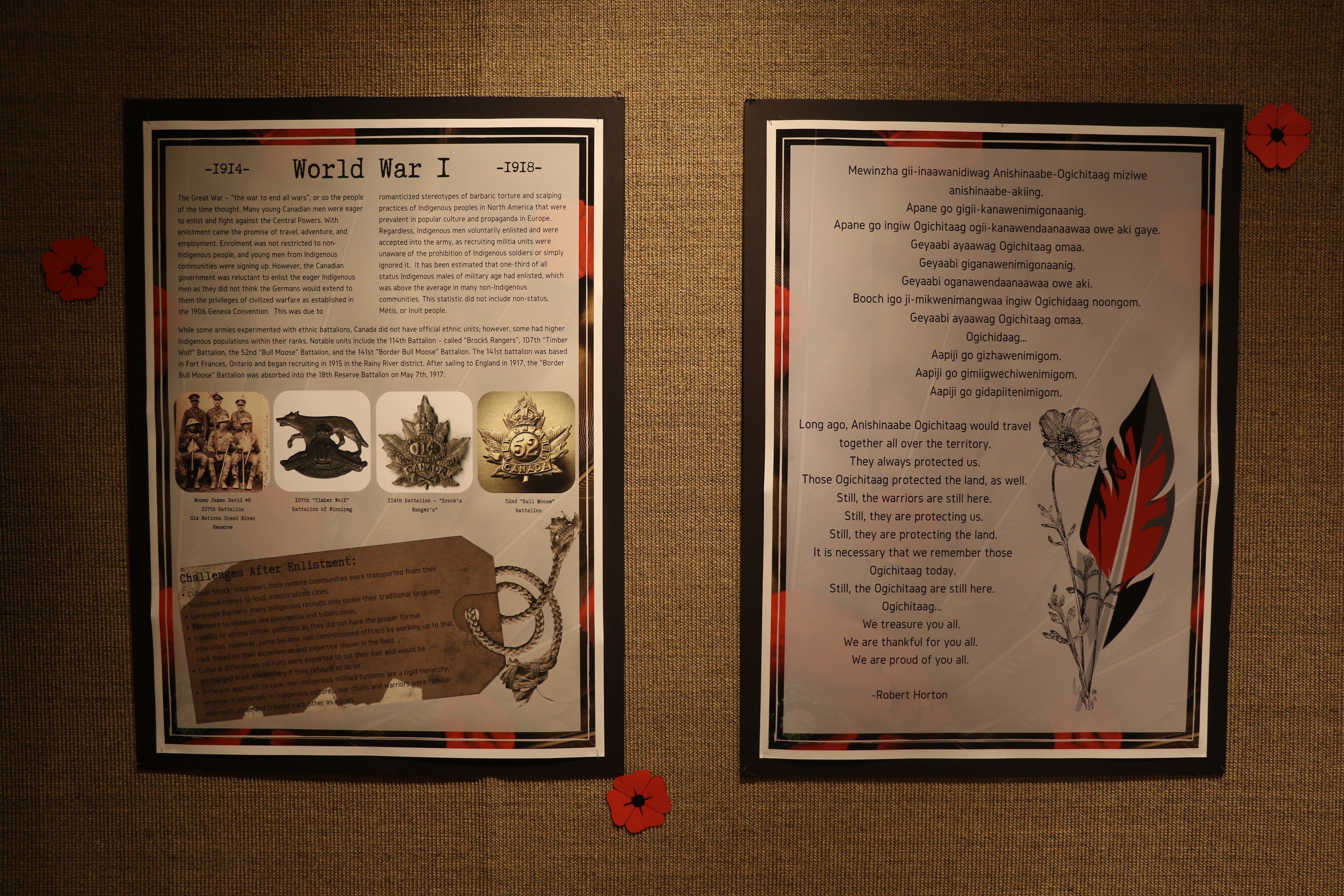Indigenous Veterans Day ceremony and exhibit

Lakehead will host an Indigenous Veterans Day ceremony on Monday, Nov. 8 at 12:15 pm in the Agora with speakers from the University and invited guests.
There will also be an exhibit featuring photos and artifacts from the World Wars.
See below for more about the exhibit, which will be on display from Monday, Nov. 8 until Friday, Nov. 12.
The Indigenous Veterans of Treaty 3 was a project developed back in 2018 by the Fort Frances Museum and Cultural Centre, Kay-Nah-Chi-Wah-Nung Historical Centre, and Glenn Jourdain of Couchiching whose research and photos laid the foundation of this project, who, unfortunately, passed away in July of 2021.
This exhibit was curated in the spirit of collaboration and reconciliation and shared the triumphs and sometimes shocking realities faced by Indigenous veterans across Canada and specifically those from Treaty #3.
With a focus on WWI and WWII, including other wars to the present day, this exhibit highlights veterans, their triumphs, setbacks, Indigenous women roles, mixing Indigenous and military culture. It honours those who came home and those who did not. This is a growing exhibit – it started with around 100 names of veterans and now it has 324.
The exhibit will also have artifacts and displays highlighting veterans of Anishinabek Territory- Robinson Superior Treaty (1850) and Métis veterans.
Special thanks to the Fort Frances Museum and Cultural Centre, Kay-Nah-Chi-Wah-Nung Historical Centre, Thunder Bay Museum, Métis Nation of Ontario, and the City of Thunder Bay's Indigenous Relations Office for loaning Lakehead these displays.
Lakehead welcomes everyone to this exhibit, but please be aware that, while the University has implemented preventative measures to reduce the spread of illness in general and of COVID-19 in particular, which is a highly contagious and dangerous disease, the University cannot guarantee that participants will not become infected with COVID-19 and/or other diseases.
By visiting this display, each participant agrees that they do so at their own risk and that they accept the risk of infection with COVID-19 and other illnesses, and that they release and agree to hold harmless Lakehead University from any and all liability for any illness or harm to anyone consequent upon the participant becoming infected with COVID-19 and/or any other disease as a result of involvement in the display.
Visitors must be fully vaccinated and provide proof of vaccination using Lakehead’s Mobile Safety app. Anyone entering a building on campus must also do the COVID-19 screening located on the Mobile Safety app and wear a mask.
National Indigenous Veterans Day | November 8, 2021
Zhimaagnishii Giizgigad
[“Soldier Day” in First Nation Ojibwe, Whitefish River First Nation]
National Indigenous Veterans Day is a day of remembrance and commemoration of the contributions of Indigenous veterans in the First and Second World Wars, as well as the Korean War.
Did you know:
- National Indigenous Veterans Day began in Winnipeg in 1994 when Indigenous veterans were not recognized in Remembrance Day activities, and is now celebrated in many communities across Canada.
- Over 12,000 Indigenous people are estimated to have volunteered in all three wars, including 7,000 First Nations members, and approximately 300 died during these conflicts.
- First Nations, Inuit and Métis people were not eligible for conscription because they were not citizens of Canada (they were also unable to vote), but many volunteered despite the challenges they faced, including traveling long distances from remote communities to enlist, learning a new language (English), and coping with racism against them.
- Indigenous people were not allowed to join the Canadian Air Force until 1942 and the Canadian Navy until 1943.
- Both men and women enlisted, serving as soldiers, nurses and in other roles. Many served with distinction, winning medals for bravery in action.
- After the war, enlisted Indigenous people returned home to continued discrimination, including in some cases denial of benefits, loss of Indian Status, and expropriation of their land by the government for non-Indigenous veterans.
- It was only in 1995 that Indigenous veterans were allowed to lay wreaths commemorating their fallen comrades at the National War Memorial in Ottawa.
- The first monument commemorating the role of Indigenous people during these three wars was dedicated in 2001 in Ottawa.
- It took until 2003 for the Government of Canada to provide veterans’ benefits to First Nations soldiers who had been denied them in the past, and Métis veterans received an apology and compensations cheques in 2019 (Métis Nation of Ontario, 2019).
- Today, Indigenous people continue to serve in Canada’s armed forces.
- Right to Play, 2021
Learn more about Indigenous Veterans:
- Indigenous Veterans – Veterans Affairs Canada
- The Memory Project: Remembering Indigenous Veterans
- Aboriginal Veterans Tribute List
- Indigenous War Heroes – Wasauksing War Hero and Native Veteran’s Educational Awareness and Commemoration Project
- The Canadian Encyclopedia: Indigenous People and the World Wars
- Aboriginal War Heroes – More Than a Few Good Men (Bob Joseph)
- Remembering & Honouring Indigenous War Heroes: World War 1 & 2
- Aboriginal Veterans Autochtones
- ONECA Teacher Resources
- Francis Pegahmagabow Bibliography
- Charles Byce Bibliography

